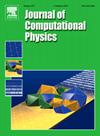使用 CFL 优化的前向后 Runge-Kutta 方案对浅水方程进行局部时间步进分析
IF 3.8
2区 物理与天体物理
Q2 COMPUTER SCIENCE, INTERDISCIPLINARY APPLICATIONS
引用次数: 0
摘要
库兰特-弗里德里希斯-刘伊(Courant-Friedrichs-Lewy,CFL)条件是显式时间步进方案稳定性的一个众所周知的必要条件,它有效地限制了给定问题的最大可接受时间步进的大小。我们针对浅水方程(SWE)制定并提出了一种在 CFL 意义上优化的新局部时间步进(LTS)方案。这一新方案被称为 FB-LTS,基于 Lilly 等人 [16] 的 CFL 优化前向-后向 Runge-Kutta 方案。我们的研究表明,FB-LTS 在应用于 TRiSK 空间离散化[21]时保持了质量和绝对涡度的精确守恒,并提供了数值实验,表明它保持了其所基于方案的时间阶次(二阶)。我们在 MPAS-Ocean 中实施了 FB-LTS 以及某种算子拆分,以测试计算性能。这种名为 SplitFB-LTS 的方案比经典的四阶 Runge-Kutta 方法(RK4)快 10 倍,比现有的基于 Runge-Kutta 的强稳定性 LTS 方案(SplitLTS3)快 2.3 倍。尽管效率大幅提高,但 SplitFB-LTS 所产生的解与 RK4 和 SplitLTS3 所产生的解在质量上是相同的。本文章由计算机程序翻译,如有差异,请以英文原文为准。
Local time-stepping for the shallow water equations using CFL optimized forward-backward Runge-Kutta schemes
The Courant–Friedrichs–Lewy (CFL) condition is a well known, necessary condition for the stability of explicit time-stepping schemes that effectively places a limit on the size of the largest admittable time-step for a given problem. We formulate and present a new local time-stepping (LTS) scheme optimized, in the CFL sense, for the shallow water equations (SWEs). This new scheme, called FB-LTS, is based on the CFL optimized forward-backward Runge-Kutta schemes from Lilly et al. [16]. We show that FB-LTS maintains exact conservation of mass and absolute vorticity when applied to the TRiSK spatial discretization [21], and provide numerical experiments showing that it retains the temporal order of the scheme on which it is based (second order). We implement FB-LTS, along with a certain operator splitting, in MPAS-Ocean to test computational performance. This scheme, SplitFB-LTS, is up to 10 times faster than the classical four-stage, fourth-order Runge-Kutta method (RK4), and 2.3 times faster than an existing strong stability preserving Runge-Kutta based LTS scheme with the same operator splitting (SplitLTS3). Despite this significant increase in efficiency, the solutions produced by SplitFB-LTS are qualitatively equivalent to those produced by both RK4 and SplitLTS3.
求助全文
通过发布文献求助,成功后即可免费获取论文全文。
去求助
来源期刊

Journal of Computational Physics
物理-计算机:跨学科应用
CiteScore
7.60
自引率
14.60%
发文量
763
审稿时长
5.8 months
期刊介绍:
Journal of Computational Physics thoroughly treats the computational aspects of physical problems, presenting techniques for the numerical solution of mathematical equations arising in all areas of physics. The journal seeks to emphasize methods that cross disciplinary boundaries.
The Journal of Computational Physics also publishes short notes of 4 pages or less (including figures, tables, and references but excluding title pages). Letters to the Editor commenting on articles already published in this Journal will also be considered. Neither notes nor letters should have an abstract.
 求助内容:
求助内容: 应助结果提醒方式:
应助结果提醒方式:


